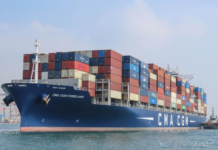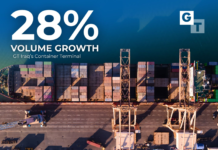
“Three years after Russia’s invasion of Ukraine, the volume of dry bulk shipments from the two countries combined is 6% below pre-war levels. However, the past 12 months have seen the countries’ dry bulk shipments develop in completely opposite directions. While Ukraine has seen an 87% y/y jump in shipments, Russia’s have taken a 6% y/y fall. Overall, their combined volume has increased 3% y/y over the last 12 months,” says Filipe Gouveia, Shipping Analysis Manager at BIMCO.
The primary reason for Ukraine’s spike in shipments lie in the success of its coastal corridor. Since August 2023, Ukraine has exported dry bulk cargoes via a coastal corridor, and despite Russian attacks on ships in September and October 2023, this has proven to be an effective solution. Nonetheless, volumes remain 36% lower than before the war began.
During the first two years of the war, Russian dry bulk shipments were less affected and even increased due to stronger fertilizer and grain exports. However, during the past 12 months, exports have fallen as coal shipments have declined 11% y/y and grain shipments have fallen 2% y/y. Russian coal accounts for 50% of the combined shipments from Russia and Ukraine.
“Over the past 12 months, tonne mile demand from Ukrainian and Russian cargoes has increased 3% y/y combined. Unlike volumes, tonne mile demand was already higher than pre-war levels during the second year at war because sanctions on Russian coal increased sailing distances. The demand increase has primarily benefitted ships in the Panamax and supramax segments, whereas capesize demand remains below pre-war levels,” stated Gouveia.
Since August 2022, Russian coal previously exported to Europe from ports in the Arctic, Baltic Sea and Black Sea was rerouted towards India, China and Turkey, boosting sailing distances. Average distances for Russian fertilizer and grain cargoes also rose due to a rise in shipments to Asia and South America.
Conversely, sailing distances for Ukrainian shipments have shortened since the start of the war. A fall in iron ore shipments has been a significant contributor. Furthermore, average distances for Ukrainian grains have decreased as shipments to the Mediterranean largely replaced shipments to Asia.
“In the medium term, Ukrainian shipments could strengthen, especially if the war comes to an end, whereas Russian shipments could continue to weaken. China is the largest destination for Russian coal and its import demand is slowing as the country expands electricity generation from renewables. Furthermore, Russian coal is facing competition from Indonesia and Australia,” commented Gouveia.






